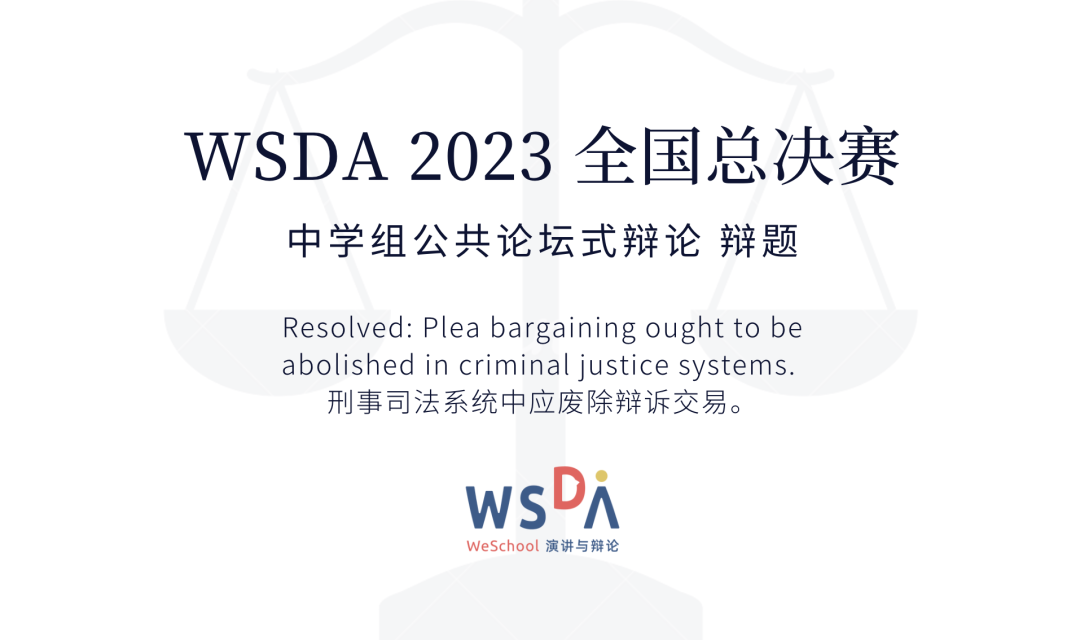
WSDA 2023 全国总决赛总决赛倒计时

Smple CaseSample Case
FUTURE IS PROMISING
Hello大家好,距离国赛的盛大开幕还有45天!
距离报名截止还有最后2天,年度最大的演讲辩论全国赛等你前来挑战!
不知道大家对辩题的了解都到了什么程度~ 今天WSDA君为大家带来正反方的Sample Cases,来助你一臂之力。
Resolved: Plea bargaining ought to be abolished in criminal justice systems. 刑事司法系统中应废除辩诉交易。
一起来看看这个辩题下可以有哪些精彩的讨论!
什么是辩诉交易?
辩诉交易是被告和检察官之间的协议,其中被告同意对针对他们的部分或全部指控认罪,以换取检察官的让步。
正方的可选框架:正义
正义应该是任何刑事司法系统的首要关切。它要求公平和平等地对待参与法律诉讼的所有个人。
正方辩手可以做的weighing:公平
公平确保个人得到公正和平等的对待,无论其社会经济地位或是否有法律代表。
反方的可选框架:效率
效率应该是刑事司法系统的一个关键考虑因素。它允许有效分配资源和及时解决案件。
反方辩手可以做的weighing:资源管理

Con Sample Case反方立论稿
We firmly negate with the resolution. Resolved: Plea bargaining ought to be abolished in criminal justice systems.
In order to ensure a fair debate, start with definitions. We define pleas bargaining as the practice of negotiating an agreement between the prosecution and the defense whereby the defendant pleads guilty to a lesser offense or (in the case of multiple offenses) to one or more of the offenses charged in exchange for more lenient sentencing.
We define criminal justice system as the network of government and private agencies intended to manage accused and convicted criminals. The criminal justice system is comprised of multiple interrelated pillars, consisting of academia, law enforcement, forensic services, the judiciary, and corrections.
Contention 1.Justice
Subpoint a. Justice for Innocents
Saving judicial resources means lawyers have more time to defend innocent people. Wilkinson, 14 tells us that Bringing losing cases to an efficient conclusion allows them to focus greater attention on more demanding or deserving matters—perhaps involving innocent defendants.
https://www.vanderbiltlawreview.org/wpcontent/uploads/sites/89/2014/06/In-Defense-of-American-Criminal-Justice.pdf
The impact of this would be overwhelming the system means rights are curtailed and innocent people go to jail.
Wilkinson, 14 continues Curtailing plea bargaining would also threaten disastrous consequences for the broader criminal justice system. For example, assuming constant resource levels, limiting pretrial negotiation would almost certainly lead to a dramatic surge in the number of trials.242 In order to cope with the systemic pressure of the multitude of new trials, courts would need to pare back their length and scope, resulting in the curtailment of rights and an increase in the rate of false convictions.
Subpoint b. Negotiated justice
Plea bargaining allows for negotiated justice, which can be more flexible and adaptable to individual cases. It allows for consideration of factors like mitigating circumstances, rehabilitation potential, and individual needs.
Abolishing plea bargaining would limit the ability to tailor justice to the specific circumstances of each case, potentially leading to less fair outcomes.
Open court means open information – coercion becomes far less likely
Brooks 2022 tells us that A judge is unable to accept a defendant’s guilty plea if it is based on ‘an unreal and untrue set of facts’.23 If a plea is based on a statement found to be untrue, then any credit for making a guilty plea would be withheld.If the judge is unconvinced of the accused’s plea of guilt, the accused can be challenged – so it is not the case that the accused can make any guilty plea they wish and have it accepted automatically with a guaranteed sentencing discount for doing so.
https://ssrn.com/abstract=4076318
Contention 2. Efficient use of judicial resources
Plea bargaining provides a level of certainty and closure for victims and their families. It allows them to avoid the uncertainties and emotional toll of a trial and move forward with their lives. Eliminating plea bargaining would prolong the legal process, prolonging the psychological impact on those affected.
Subpoint a. Plea bargaining solves
English system resolved 80% of cases through plea bargaining
Brooks 2022 quantifies that Instead of plea bargaining before trial, the English system grants sentencing discounts for charged offences on an early guilty plea to that charge.12 As a result, defendants that plead guilty are accepting their responsibility for this charge – and not for some different offence(s) like in the United States. In 2020/21, nearly 80 per cent of cases in magistrates’ courts and about 78 per cent of cases in the Crown Court were resolved by guilty pleas
http://dx.doi.org/10.2139/ssrn.4076318
Subpint b. Efficiency
Plea bargaining helps alleviate the burden on courts by resolving cases quickly and efficiently. By negotiating a plea deal, defendants can accept responsibility for their actions and avoid lengthy trials. This allows courts to focus their resources on more complex cases, reducing backlog and delays in the criminal justice system. Efficiency key for victims – shortens suffering by reaching a faster resolution
Brooks 2022 tells us that a policy of encouraging early guilty pleas aims to reduce the impact of crime on victims and to save victims and witnesses from the need to testify. These additional reasons are non-instrumental. They speak to the anxiety and distress that victims and witnesses can experience in attending trials and being called on to testify. ‘guilty pleas are good not just for the system’s accounting, but for victims and other witnesses who need not take the time, the trauma or the physical risk of giving evidence’. In research conducted for the Sentencing Council, it found victims to be more supportive of guilty plea sentencing than the general public. Victims are a key stakeholder and their broad support matters – and has non-instrumental value
http://dx.doi.org/10.2139/ssrn.4076318
For all these reasons above, we are so proud to negate.
Pro Sample Case正方立论稿
We firmly affirm with the resolution. Resolved: Plea bargaining ought to be abolished in criminal justice systems.
In order to ensure a fair debate, start with definitions.
We define plea bargaining as the practice of negotiating an agreement between the prosecution and the defense whereby the defendant pleads guilty to a lesser offense or (in the case of multiple offenses) to one or more of the offenses charged in exchange for more lenient sentencing.
We define criminal justice system as the network of government and private agencies intended to manage accused and convicted criminals. The criminal justice system is comprised of multiple interrelated pillars, consisting of academia, law enforcement, forensic services, the judiciary, and corrections.
Contention 1. Justice contradictions
Plea bargains contradict desert. Defendants receive a lesser punishment for admitting to a crime they did not commit
Brooks 2022 tells us that,plea bargaining is more than receiving a lesser punishment for a crime; but, instead, it is about receiving a lesser punishment for a different kind of crime typically entailing a lesser charge. Therefore, American plea bargaining can be about changing both the kind of crime that is punished and not only the amount of punishment in relation to that crime.
The bargains lead to defendants admitting to crimes they did not actually commit in return for lesser sentencing.
http://dx.doi.org/10.2139/ssrn.4076318
The impact under this contention would be inequality.
Plea bargaining contributes to inequalities within the criminal justice system. Defendants with limited resources or facing harsher charges may feel pressured to accept a plea deal, even if they are innocent or have a weak case.
https://ssrn.com/abstract=4076318
Brooks 22 quantifies that American plea bargaining takes place almost exclusively ‘behind closed doors and with no judicial oversight. Racial discrimination is endemic in the American criminal justice system with wide disparities in the rate of conviction and length of sentences for convicted defendants by race – and plea bargaining does not appear to reduce these injustices. Without judicial oversight and a lack of empirical information, there are insufficiently robust safeguards to counter any implicit bias and discrimination in plea bargaining.
Abolishing plea bargaining would help level the playing field and ensure fairer outcomes.
Contention 2. Coercion
Plea bargaining often involves coercive tactics by prosecutors, such as threatening defendants with longer sentences if they go to trial. This undermines the principles of justice and can lead innocent individuals to plead guilty to avoid the risk of severe punishment.
subpoint a. Power Imbalance
Plea bargaining gives prosecutors an extreme amount of power over the defendant
Lord 21 clarifies that Plea negotiations, suffer from a similar asymmetrical power structure. The possibility of charging a crime carrying a lengthy mandatory minimum might easily compel a defendant who is otherwise reluctant to accept any plea offer into a choice as severe as assuming the label of “convicted felon” in order to avoid the immediate pain of incarceration. The inordinate power that society has handed prosecutors gives them the ability to strike Faustian bargains4 with defendants, who may accept substantial long-term harm to themselves in order to achieve a short-term benefit.
https://ssrn.com/abstract=4068420
The impact would be pleading guilty.
Plea bargaining fast tracks the criminal justice process in place of seeking true convictions, this results in innocent people being forced into pleading guilty.
Neil 19 quantifies that More than 97 percent of federal criminal convictions are obtained through plea bargains, and the states are not far behind at 94 percent. some 11 percent pleaded guilty to crimes they did not commit since 1989. The National Registry of Exonerations puts the total number at 20 percent since 1989. But whatever the precise figure, it is clear that innocent people are routinely coerced into pleading guilty to crimes they did not commit.
subpoint b. Mass Incarceration
Plea Bargaining drives mass incarceration.
Sutter 20 points out that mass incarceration illustrates a limit of the economic argument.¶ Our criminal justice system extensively employs pleas; 97 percent of criminal convictions result from such bargains.mass incarceration could not happen without low cost plea bargains. Sloppy and faked drug tests in two different Massachusetts crime labs recently led to 47,000 convictions being thrown out.
https://www.heartland.org/news-opinion/news/the-good-and-bad-economics-of-plea-bargains
The impact of this contention would be excessive sentences, as defendants may accept a deal to avoid the risk of harsher punishment if they go to trial.
By eliminating plea bargaining, there would be a greater emphasis on individualized sentencing, reducing the problem of over-incarceration. Dervan 13 illustrates that today, over 96% of convictions in the federal system result from pleas of guilt rather than decisions by juries. By assigning a fixed and narrow penalty range to almost every definable offense, sentencing guidelines often empower prosecutors to dictate a defendant’s sentence by manipulating the charges.Many have surmised that the larger the sentencing differential, the greater the likelihood a defendant will forego his or her right to trial and accept the deal.
https://scholarlycommons.law.northwestern.edu/jclc/vol103/iss1/1
For all these reasons above, we are so proud to affirm.
全国总决赛等你来挑战
希望这次的Sample Case能给大家带来新的启发,也期待通过Sample Cases大家可以对辩题有更多理解和新的思路。
历年真题+测试题大合集超详细
长按图片即可添加客服



